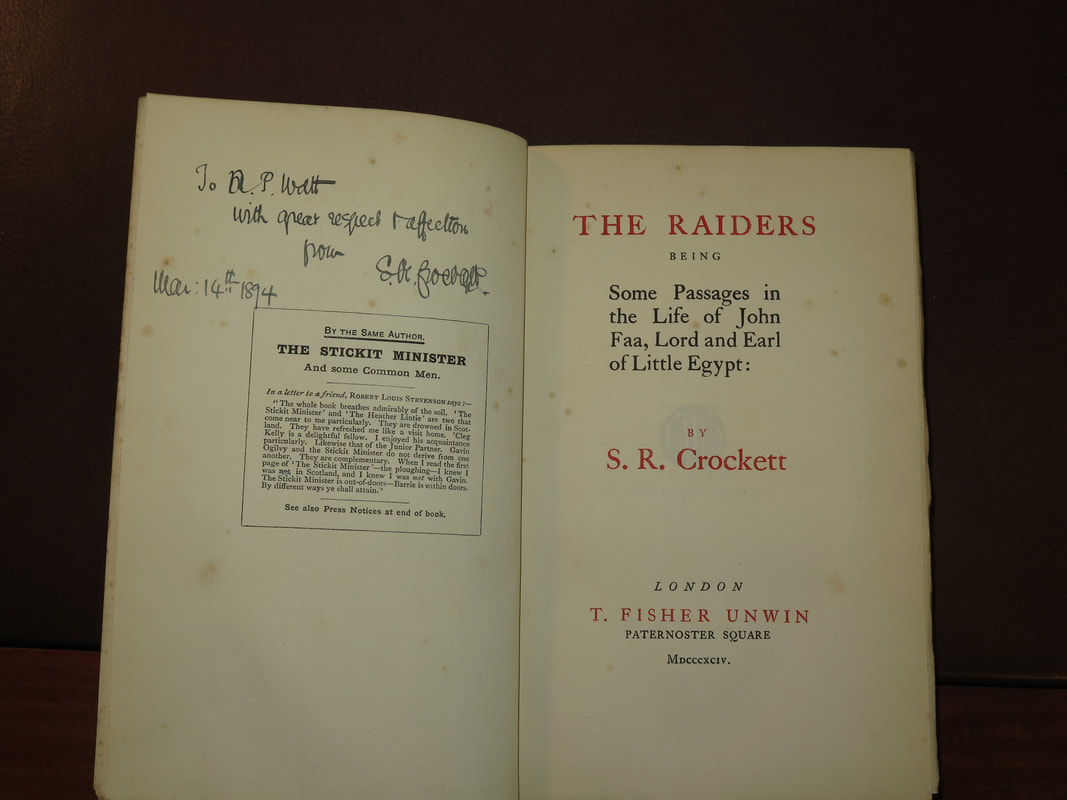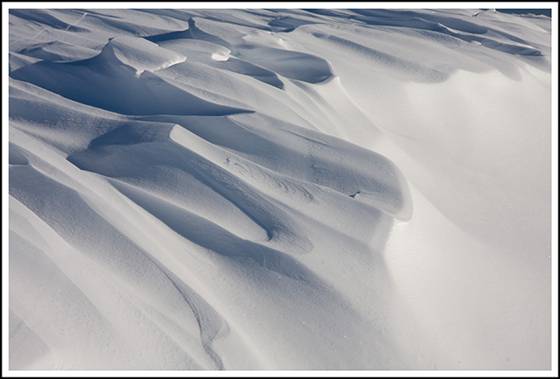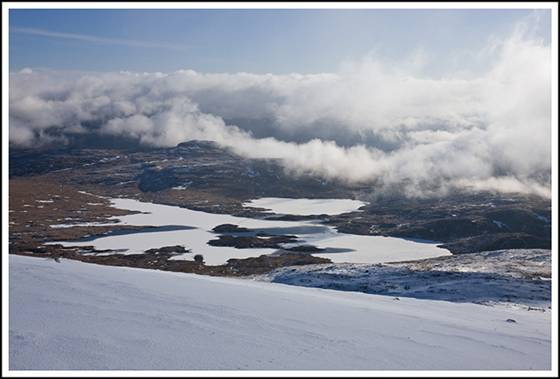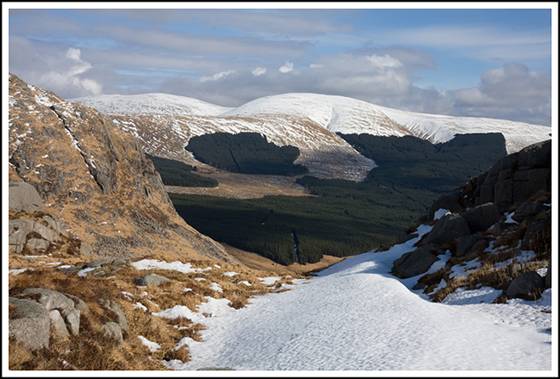|
130 years ago today ‘The Raiders’ was published. It was Crockett’s first published novel, following on from the overwhelming success of his short story collection of March 1893 ‘The Stickit Minister and some common men’ which was now in multiple editions. At the time of The Raiders publication Crockett was preparing for an Illustrated edition of ‘Stickit’ as well as working with his publisher T. Fisher Unwin on three other manuscripts which which would be published in 1894. ‘The Lilac Sunbonnet’ was being serialised (to be published in novel form in the autumn of 1894 in Britain and America) while ‘The PlayActress’ and ‘Mad Sir Uchtred,’ both short novellas, were in production.
Crockett was making waves in the London literary scene. It was, as we say, a dog eat dog world. Without some knowledge of publishing history it’s hard to contextualise the legacy we’ve been given of Crockett – which is key to answering a question I’m asked a lot ‘why have I never heard of S.R.Crockett?’ Let’s start unpacking this bigger story by looking at the actual publication of ‘The Raiders’ Crockett’s breakthrough novel. ‘The Raiders’ was due to be published on March 1st. Publishing rules at the time meant that no one should review a book until it was actually in print. Publication slipped from March 1st to March 10th and somewhere during the confusion a review came out in The Scotsman on March 5th. This caused Crockett’s publisher (T.Fisher Unwin) some consternation and there are some testy letters between author and publisher. Remember that at this time it’s in Crockett’s best interest to keep his ‘new’ publisher on side. And that said publisher had some history of disagreements with both Crockett’s agent A.P.Watt and his ‘champion’ W. Robertson Nicoll. One cannot take personalities out of this picture. It was finally released to the world on March 10th to great acclaim. Crockett went on to write over 60 other works which were usually published in serial magazine form before being released as novels. Ironically, ‘The Raiders’ is one of a few which were not serialised and now, 130 years on, it is about to be serialised on Radio 4 (June this year) for the first time. Let’s hope you wait 130 years for one radio serial of Crockett and then multiple turn up. There’s certainly a lot of mileage in Crockett’s work for both Radio and screen adaptations – that’s a drum I’ve been banging for decades. Not long to wait now…  Personal signed copy from Crockett to his agent A.P.Watt Personal signed copy from Crockett to his agent A.P.Watt Feb 28 1894. Crockett receives his first author copy of The Raiders which is due to be published in March. This follows a period of several months of proofing back and forth with his publisher, detailed in a series of letters. There was quite a lot of press interest in the publication throughout February. In a letter to his publisher, T.Fisher Unwin, Crockett requests for author copies to be sent to various contacts. It’s an interesting list. Feb 28th Dear Unwin, As I said in my telegram, I heartily congratulate you one the format of the book. I do not see a single possible improvement except omission of the list of publications at the end, which being printed for a larger publication is cut into the margin and looks out of keeping with the book. Otherwise the printing, paper, binding of the book, are all that I could wish. You have most certainly done your part admirably, and I am grateful for your great care. The book opens nicely, which is to my mind the be-all of good binding and it is very agreeable to handle. I asked you to send me another copy for Dr Whyte, who is not a critic but my very dear friend of many years. You would probably send it yesterday… if not you might do so at once. I am going to Edinburgh to see him on Friday and I should like to take him a copy as Dedicatee. It is very generous of you to suggest that I should send a list of reviews, critics etc. You are so judicious with your own sending that if you send somewhat liberally to the Scottish Local papers, of which Wylie has a better knowledge than I (and of which you can get a list from W) that would be for Scotland. I do not know many critics which makes the Stickit criticisms the more remarkable. But you might send copies, with, I think, advantage to:
The epic ‘Sixteen Drifty Days’ in The Raiders takes four chapters in the telling,
beginning at Chapter 44: THE SIXTEEN DRIFTY DAYS Without, the hurricane drove ever from the south. It was the first of the famous Sixteen Drifty Days which are yet remembered over all the face of the hill country, when of sheep and cattle the dead far outnumbered the living. The snow drove hissing round the corner of the Aughty and faced against the entrance in a forty foot wreath. Looking down in the breaks of the storm we could see only the wild whirl of drifting whiteness in the gulf of the Dungeon of Buchan. But it was warm and pleasant within. The fire drew peacefully with a gentle draught up the side of the rock, and the heather couches on the floor were dry and pleasant. Even the House of Rathan had hardly been more homelike than the cave called the Aughty, on the eastern face of the precipice of the Star which overlooks the Dungeon. It was here that Silver Sand, that was John Faa, belted Earl and Gypsy, told his story. And after a digression for 'the story' of some three chapters… THE LAST OF THE OUTLAWS On the morning of the seventeenth day, when we were becoming anxious for those whose anxiety for us we dared not think upon, we looked out, and lo! the great blast—the greatest of a century—had blown itself out. We gazed abroad on the face of the world, and the sight made us both fear and quake, and that exceedingly. It was a clear, bright morning when we put aside the mat and looked out. The brightness was like the kingdom of heaven. There was a chill thin air blowing, and the snow was already hard bound with frost. We looked down into the Dungeon of Buchan. Its mighty cauldron that had the three lochs at the bottom, was nearly full of snow. The lochs were not. The Wolfs Slock was not. The night before we had only seen a whirling chaos of hurrying flakes of infinite deepness. The morning showed us the great valley almost levelled up with snow, from Breesha and the Snibe to the Range of Kells. We stepped from the door upon the first wreath. It rose in a grand sweep which curved round the angle of the hill. We set foot on it, and it was strong enough to bear us. So closely had the particles been driven by the force of the wind, that as soon as the pressure was taken off, the frost bound the whole mass together firm as ice and smooth as ivory. Then as we stood on the top there was a wonderful sight to be seen. A wide world of wreathed snow. Read the rest of the story by downloading The Raiders PDF version for free In 2024 there's been some significant January snow (at least here in exile at Raiders HQ) and it takes nothing for me to delve back into Crockett's descriptions of snow.
Here, from the 2017 January archive, are some examples: (Clicking on the title will take you to the free downloadable PDF version). ‘The last Anderson of Deeside, and the best of all their ancient line, was gathered to his fathers in an equal sleep that snowy January morning. There were two inches of snow in the grave when they laid the coffin in.’ (Bog Myrtle) Now the moons of the months are wondrously different: the moon of January, serene among the stars; (The Raiders) It was a high day and a holiday at the Bothy of the Wild of Blairmore—a high day though a short one—one of the shortest of all the year, though by this time it was well into January. (Moss Troopers) The winter snow was long in coming that year in Drumquhat. The banks of dark gray clouds had showed several times over the moors, and the long, bleak ridge of Ben Gairn had been white for a month; but now, in the middle of January, came the first big fall. It began just as the short daylight was fading away. The flakes fell slow and silent. There was no wind at first, and each flake settled upon the last like a curled feather, some of them as broad as the palm of Wattie's hand. (Galloway Herd) It was a grim and notable January night — the fourth day of the great thaw. The rain had gusted and blown and threshed and pelted upon those window-panes of Whinnyliggate which looked towards the west, till there was not a speck of dirt upon them anywhere, except on the inside. The snow had melted fast under the pitiless downpour, and the patient sheep stood about behind dyke-backs, or with the courage of despair pushed through holes in bedraggled hedges, to take a furtive nibble at the brown stubble of last year's cornfields. (Stickit Minister’s Wooing) I observe in John's old diary (to which I have access), the entry for the 15th of January runs thus: ‘Found F. in school-room. Helped her unroll maps!’ ... ‘I have been made aware that upon a certain date of January of this present year my son Rupert foolishly and without my knowledge went through a form of marriage with you. Into the legality or illegality of that ceremony I shall not enter. It is sufficient that the fact cannot now be proved in any court of law.’ (Banner of Blue) The voices of the men of Suliscanna crying harshly to each other among the craig-heads and cliff-edges high above her sounded to Kate’s ears like a louder brawling of the sea-fowl. The sound had an edge on it, shrill, keen, and bitter as the east wind in mid January. (Lochinvar) |
2024Celebrating Galloway Raiders 10th Anniversary. Archives
May 2024
Categories
All
|




 RSS Feed
RSS Feed
